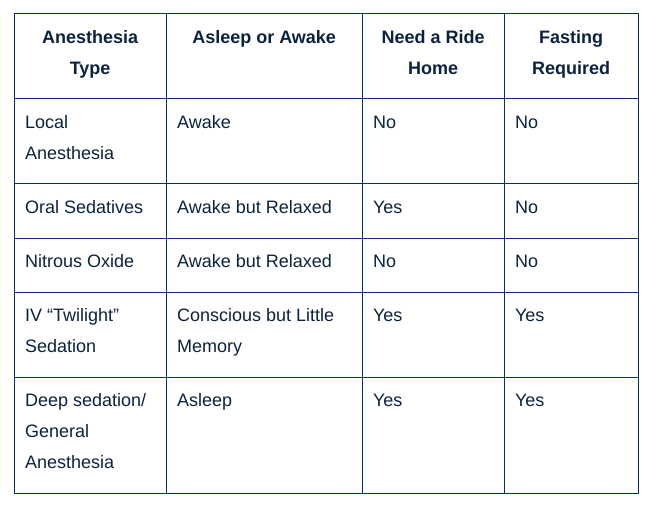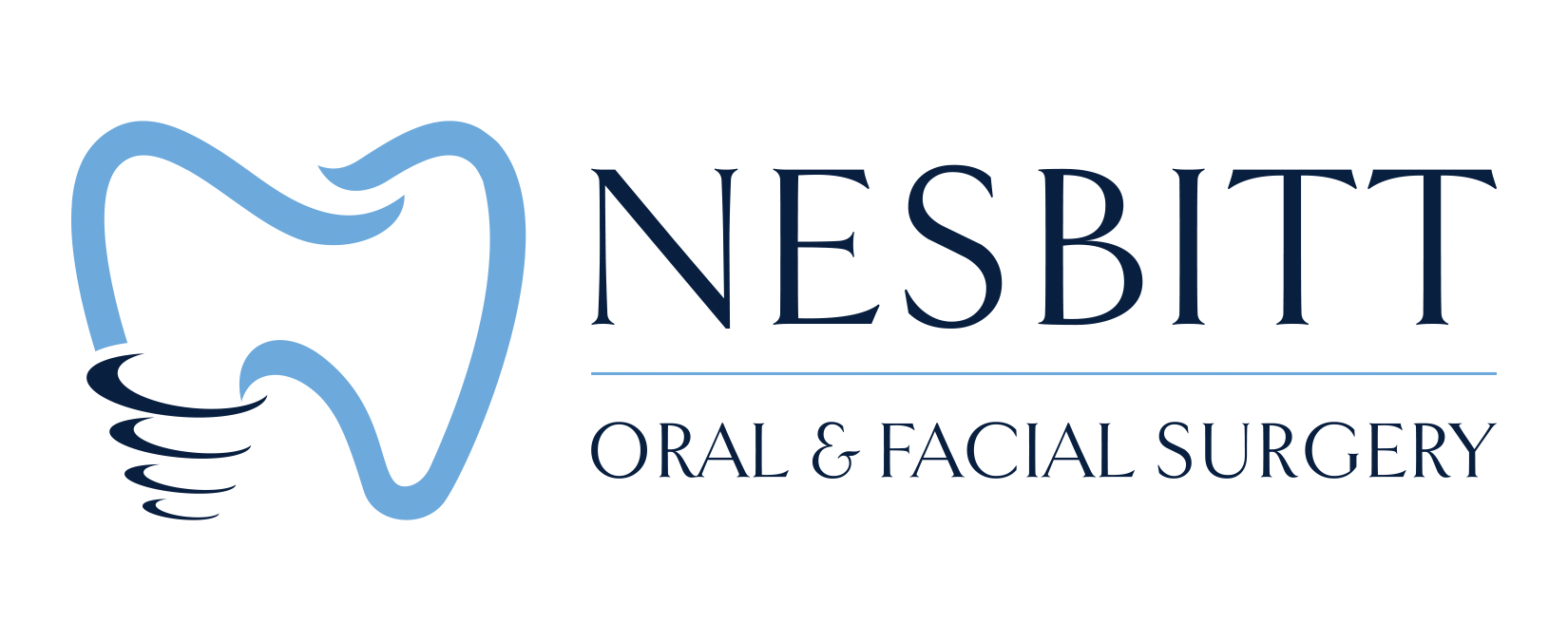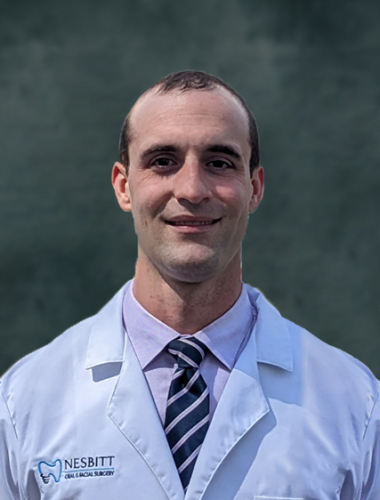
Anesthesia
Several methods of anesthesia are available for dental and oral surgery procedures. The chosen method of anesthesia depends upon the nature of the surgical procedure, the patient’s health status, and the patient’s level of apprehension. Oral surgeons are specially trained to administer general anesthesia and are required to complete a comprehensive, hospital-based residency program where they receive extensive experience administering IV sedation or general anesthesia and handling emergency situations. During this time, they work closely with anesthesiologists, general surgeons, and medical specialists. This allows oral surgeons to block your pain during surgery, decrease your anxiety around dental treatment, and allow you to sleep during your surgical procedure.
Types of Anesthesia
There are many anesthetic options available to you for your dental procedure. This can range from local anesthesia (numbing injection), nitrous oxide/mild conscious sedation (laughing gas to decrease anxiety), moderate sedation, and IV deep sedation/general anesthesia. Before your surgery, Dr. Nesbitt will discuss all of your anesthesia options, complete a thorough review of your medical history, and perform a thorough examination. This is all done to ensure you are a good candidate for in-office sedation and ensure your surgery is performed in the safest manner.
Local Anesthesia
This provides numbing to a localized area of the mouth. A local anesthetic (a numbing agent) is injected into the surgical site. This will prevent any pain from being sensed in the area during surgery. With local anesthesia, you are fully awake and aware. It is normal to still feel pressure during a procedure under local anesthesia, but you will not feel pain. This is usually reserved for simple surgical procedures.
Nitrous Oxide/ Minimal Sedation (Laughing Gas)
A small breathing mask is placed over your nose to supply a mixture of nitrous (laughing gas) and oxygen. This provides relaxation or anxiolysis (anxiety reduction) during your procedure. During this procedure, you are conscious but more relaxed. A local anesthetic is also used to numb the surgical area. With nitrous, you will be aware of the procedure being performed. It is short-acting and, in fact, only works while being breathed in, and its effects quickly wear off once it is turned off. You will be able to drive yourself home after the procedure. This may be a good option for minor surgical procedures in people with dental anxiety.
Moderate Sedation
This is often referred to as “twilight sedation.” IV medications are administered that place you in a state between awake and asleep. You may fall asleep with this sedation but are easily awakened with verbal or tactile stimulation. You will likely not remember the procedure that was performed and will feel drowsy or sleepy.
Deep Sedation / General Anesthesia
Again, with this form of sedation, an IV will be placed so that anesthetic medications can be administered. After medications are administered, you will “fall asleep/enter an induced state of depressed consciousness.” The procedure will be performed while you are sleeping. The surgeon and surgical assistants will monitor your vital signs and breathing during surgery. You will not respond to verbal stimuli or react to the stimulus of surgery. With this level of sedation, a repeated tactile stimulus is needed to elicit a response. You will feel drowsy for a few hours after the surgery. The surgeon is careful to provide an adequate level of medications to put you in a state of sleep while also ensuring you remain breathing on your own.

In most cases, all levels of anesthesia can be provided in our office. However, sometimes due to medical conditions or the nature of the surgical procedure you are having, it may require general anesthesia in the hospital setting. Dr. Nesbitt will talk to you about all of your options.
Preparing for Anesthesia
If you have your procedure under local anesthesia or with nitrous oxide only, you do not need to fast before surgery and will be able to drive yourself home after surgery. If you are scheduled for any form of IV sedation, you will need to fast prior to surgery. In general, to simplify the guidelines, we recommend you refrain from eating or drinking after midnight the night before surgery. If instructed by Dr. Nesbitt to take any medications before surgery, it is OK to take medications with a small sip of water.
If you are having any form of anesthesia that alters your consciousness (oral sedation, moderate sedation, or deep sedation / general anesthesia), you will need to arrange to have a ride to and from your procedure. We ask that your ride stays on the premises during your entire visit.
Visit our pre-operative instructions for complete pre-operative guidelines regarding your scheduled surgery under anesthesia.
IV Sedation / General Anesthesia
Your safety matters! Qualified oral surgery applicants undergo an in-office evaluation by a state dental board appointed examiner. The examiner observes an actual surgical procedure during which general anesthesia is administered to the patient. The examiner also inspects all monitoring devices and emergency equipment and tests the doctor and the surgical staff on anesthesia-related emergencies.
During general anesthesia, medications are administered through an intravenous line (I.V.). The patient falls asleep and is completely unaware of the procedure being performed. Supplemental oxygen is delivered through a nasal breathing apparatus, and the doctor and a dedicated surgical assistant closely monitor the patient’s vital signs.
General anesthesia is available for all types of oral surgery. A patient may choose general anesthesia for simple procedures, depending on their level of anxiety. General anesthesia is typically recommended for most people having their wisdom teeth removed or having a dental implant placed. Contact us for more information on our procedures or to schedule an appointment!

